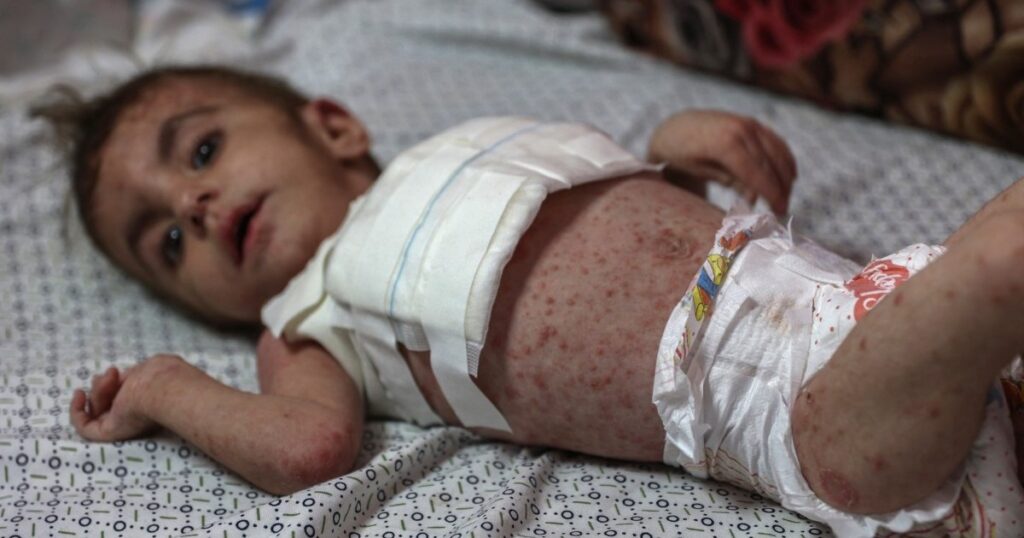Wafaa Elwan’s five-year-old son cannot sleep in the Gaza tent city where she and her seven children are sheltering, but it is not the weapons of war that are causing his nightmares.
“My son can’t sleep all night because he keeps scratching his body,” the worried mother said.
The boy has white and red spots on his feet and legs, and even more under his shirt. He is one of many in Gaza suffering from skin infections, ranging from scabies to chickenpox, lice, impetigo and other crippling rashes.
More than 150,000 people in the Palestinian territory have contracted skin diseases in the squalid conditions displaced people in the enclave have been forced into since the start of Israel’s war on Gaza, according to the World Health Organization.
“We sleep on the ground, on the sand, where the worms come out,” says Elwan. His family is among thousands of people living on a stretch of sand near the sea, not far from the town of Deir el-Balah in central Gaza.
Elwan believes that infections are inevitable. “We can no longer bathe our children like before. There are no hygiene products and sanitary products to wash ourselves and clean the place. There is nothing.”
Parents used to tell their children to wash in the water of the Mediterranean. But pollution that has built up from the war and damage to basic infrastructure has increased the risk of disease.
“The sea is just a pile of sewage. Even garbage and baby diapers are thrown into it,” she explained.
WHO has reported 96,417 cases of scabies and lice since the start of the war, 9,274 cases of chickenpox, 60,130 cases of rash and 10,038 cases of impetigo.
Scabies and chickenpox are particularly prevalent in the Palestinian coastal territory, according to Sami Hamid, a pharmacist who runs a makeshift clinic in the Deir el-Balah camp.
Two boys at the clinic had dozens of the characteristic chickenpox blisters and scabs spread across their hands, feet, backs and stomachs.
Lacking medication, Hamid, 43, himself displaced, rubbed calamine lotion on the boys’ skin to soothe the itching.
Children’s skin suffers “from the heat and lack of clean water,” he said.
Mohammed Abu Mughaiseeb, medical coordinator in Gaza for Doctors Without Borders, known by its French initials MSF, said the children were vulnerable because “they play outside, they touch anything, they eat anything without washing it.”
Abu Mughaiseeb said that hot weather increases sweating and the accumulation of dirt that causes rashes and allergies, which if scratched lead to infections.
“People no longer live in houses, there is no proper hygiene,” he said.
MSF doctors fear the emergence of other skin diseases, such as leishmaniasis, which can be fatal in its most virulent form.
Children in Gaza are already highly vulnerable to disease, he said, because their immune systems are weakened by malnutrition.
Hamid, the pharmacist, said his team recently visited a makeshift school, where 24 of the 50 students had scabies.
Other diseases are also spreading in displacement camps, fuelled by poor hygiene, WHO warns.
“The toilets here are rudimentary, water flows into channels between the tents, which contributes to the spread of epidemics,” Hamid said.
WHO said 485,000 cases of diarrhea have been reported.

